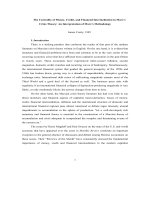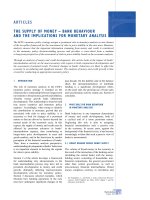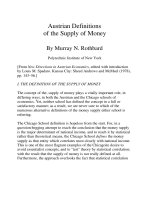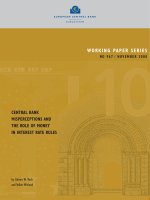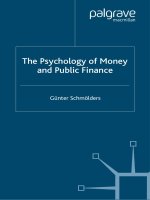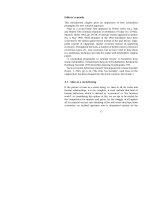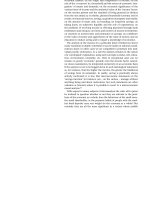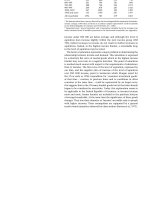The wisdom of money
Bạn đang xem bản rút gọn của tài liệu. Xem và tải ngay bản đầy đủ của tài liệu tại đây (9.97 MB, 295 trang )
The Wisdom of Money
The Wisdom of Money
Pascal Bruckner
translated from the french
by steven rendall
Cambridge, Mass ac hus etts
London, E ngland
2017
Copyright © 2017 by the President and Fellows of Harvard College
All rights reserved
Printed in the United States of America
First printing
First published as La Sagesse de l’Argent
© Éditions Grasset & Fasquelle, 2016.
Book design by Dean Bornstein
Library of Congress Cataloging-in-Publication Data
Names: Bruckner, Pascal, author.
Title: The wisdom of money / Pascal Bruckner ; translated from the French
by Steven Rendall.
Other titles: Sagesse de l’argent. English
Description: Cambridge, Massachusetts : Harvard University Press, 2017. |
“First published as La Sagesse de l’Argent © Éditions Grasset & Fasquelle,
2016.”—Title page verso | Includes bibliographical references and index.
Identifiers: LCCN 2016044101 | ISBN 9780674972278 (alk. paper)
Subjects: LCSH: Money—Philosophy. | Money—Social aspects. |
Money—Moral and ethical aspects.
Classification: LCC HG220.3 .B7813 2017 | DDC 306.3—dc23
LC record available at https://lccn.loc.gov/2016044101
To my Tutsie
No one has condemned wisdom to poverty. . . .
I will scorn the entire domain of fortune,
but I shall select the better part of it,
if a choice be given me.
Seneca
Contents
Translator’s Note ix
Introduction: Lenin’s Wishes 1
Part One: The Worshippers and the Despisers
1. The Devil’s Dung 9
2. On the Eminent Dignity of the Poor? 31
3. France, or the Taboo on Money 41
4. America, or Spiritual Money 60
Part Two: Three Myths about the Golden Calf
5. Money, the Ruler of the World? 79
6. Does Opulence Make People Unhappy? 108
7. Has Sordid Calculation Killed Sublime Love? 135
Part Three: Richesse Oblige
8. Should Bourgeois Values Be Rehabilitated? 165
9. Getting Rich Is Not a Crime
(and Falling into Poverty Is Not a Virtue) 190
10. The Hand That Takes, the Hand That Gives Back 211
Conclusion: An Acknowledged Schizophrenia 234
Notes 239
Index 265
Translator’s Note
Quotations of works that first appeared in English are given, so
far as possible, in their original form. Unless otherwise noted, all
translations into English of quotations originating in other languages are my own. Quotations from the Bible cite the Revised
Standard Version of the Bible, copyright © 1946, 1952, and 1971 the
Division of Christian Education of the National Council of the
Churches of Christ in the United States of America. Used by
permission. All rights reserved.
I would like thank Lisa Neal for her careful reading and many
suggestions for the improvement of this translation.
ix
The Wisdom of Money
Introduction: Lenin’s Wishes
In
1921, in a rare moment of lyricism, Vladimir Ilyich Lenin
made the following promise to proletarians: he would have golden
toilets made for everyone as soon as communism achieved world
domination, once this metal had been deprived of all value. This
was a twofold symbol. The most trivial places of communist society would henceforth be as luxurious as the palaces of the bourgeoisie. But above all, the working class would be relieved of the
very incarnation of h
uman rapacity—that accursed money, whose
connections with anality had been underlined by Freud. Socialism
would outdo capitalism at the same time that it disqualified it. A
piquant detail: in 2013, the American celebrity Kim Kardashian
and her husband, the rapper Kanye West, had gold-plated toilets
installed in their house in Los Angeles at the modest cost of just
over half a million dollars. $550,000. Lenin had been heard,
though not necessarily by those whom he had addressed.
Money is one of those things that seem obvious but aren’t. It is
truly the commoner of life, as crude as it is burdensome. It seems to
go without saying but remains a mystery in broad daylight. The
French word for money (“argent”) is marvelously ambiguous: it
also stands for the silver long used to make coins. Nothing can be
said about money without asserting the contrary: that it is vulgar
and noble, fiction and reality. It separates and connects people; it
frightens us when there is a lot of it and frightens us when there
is a lack of it. It’s a good that does evil, an evil that does good.
The first coins, historians tell us, date from the third millennium
1
Introduction
bce in Ur, and w
ere struck with the image of Ishtar, the goddess
of fertility and death, a curious duality.1 Money is the universal
pidgin par excellence, comprehensible everywhere; anyone can
manipulate it, no matter what his language or religion; everyone
can convert it instantaneously, in the depths of the desert as well
as in the most remote islands.
Money implies, first of all, confidence. In Rome, the first coins
were connected with their owners and the credit they enjoyed.
Today, disconnected from the gold standard, their value varies
with the economic health of the nations that issue them. They
are imbued with an aura of sacredness, b
ecause they incarnate a
people or a precise community. Money features in two kinds of
stories: those of the oppressors who crush the forsaken by financial means, and t hose of the oppressed who f ree themselves thanks
to financial independence. In one case, it is a power that enslaves;
in the other, a force that liberates. That is its ambiguity: when it
is condemned, we want to defend it; when it is defended we want
to attack it. Like sex, it is overflowing with meaning, giving rise
to countless synonyms that never really designate what it is:
bread, lettuce, gravy, jack, loot, moola, scratch, portraits of dead
presidents. And this is true in all languages.
It is not only a unit of exchange and a receptacle of value, but
above all a barometer of our desires. The measure of all passions,
it has become the absolute passion in which all the others are
reflected. Contrary to the commonplace about its making the
world uniform, we have colored it with our many affects. The vices
with which it is associated—cupidity, envy, avarice—existed before
it, but in each case it seems to amplify them. The enthusiasms as
well as repulsions that it arouses are themselves symptomatic. What
is fascinating about it is its status as a creation that has escaped
2
Introduction
its creator’s grasp and turned on him, a discreet offshoot turned
into a mad tyrant.
To talk about money is always to talk about oneself. I was
spared the injury of poverty; a fter a difficult youth my parents
achieved a degree of affluence before sinking into debt. They
began to count their pennies, and endured the bitterness of losing
their social status. Death came to them when they were in a state
of near destitution. So far as I was concerned, I moved from a careless indigence while I was a student to an intermittent prosperity. For a long time, I d
idn’t worry about money, certain that
luck would always be generous to me, and that the royalties derived from my writing w
ere not a salary but a gift. Money offers
the only truly precious value in this world: time, its inexhaustible
abundance. In this respect it is liberating. When money is lacking,
life is reduced to an eternal present that incarcerates us. I have
always distinguished between my job and the reasons for existing.
The two have sometimes coincided, but for all that without relieving me of the necessity of earning a living.
I recall with nostalgia that period; it was a time, lasting until I
was in my forties, in which I considered money negligible. If
there was some, that was good; if t here was none, one got along.
A marvelous nonchalance allowed me to consider material prob
lems unimportant so long as I could explore the world, broaden
my horizons, escape platitudes. It was a happy youth that lasted
a long time, when the dividing line ran not between the necessary and the superfluous, but between the necessary and the essential. Among the essentials: the mysticism of the book, travel to
Asia and India, feverish discussions, political commitments, demanding friendships, unusual experiences, multiple love affairs,
and especially the opportunity to live my passion for writing. I like
3
Introduction
to think that money became a concern only with age, with the
fear of not having enough of it in a society that has made it its
center, with the end of the lyrical years and the Cold War, in the
wake of the Thatcher and Reagan conservative revolution that
forced Western culture to sober up and shift to more materialistic
celebrations of tangible reality. It is a shift that is fading as we see
once again different worldviews coming into violent confrontation.
Getting old means slipping into the order of calculation, into
the order of the account balance. Everything becomes limited for
us, days number fewer. Time is no longer a profusion, it becomes
a reprimand. For me, however, the supreme luxury, even t oday, is
not to own beautiful cars, big apartments, or vacation homes, but
rather to be able to prolong the student life into an advanced age.
A student’s life is one of daily improvisation, a taste for wandering
the streets, long hours in a cafe, a flaunted detachment, indifference to honors and emoluments, and the symbolic trinkets with
which people like to deck themselves to ward off the passing
years. In sum, it is the absurd but necessary illusion of beginning
a new life e very morning. In such a life, if I feel privileged, it’s
because I have invented that privilege for myself. Being neither
the heir to a fortune nor a financier, I have never been rich enough
to forget money or poor enough to neglect it.
Money is therefore a promise in search of wisdom. This should
be understood in two senses: it is wise to have money, and wise to
reflect critically on it. Money forces us constantly to arbitrate between our desires, our assets, and our debts. It makes everyone a
philosopher in spite of himself: thinking well is also learning to
spend well, for oneself and for others. Money is revealing: it exposes the tightwad and the profligate, the miserly and the envious, all betrayed by how they reach into their pockets. No one
is at ease with money. Those who believe they detest it secretly
4
Introduction
worship it. Th
ose who worship it overestimate it. Those who pretend to despise it are lying to themselves. A problematic passion,
an impossible condemnation. That is the difficulty. But if wisdom
does not consist in attacking the very thing we all recognize as
the height of folly, what good is philosophy?
5
PART I
The Worshippers and the Despisers
[ one ]
The Devil’s Dung
No one can serve two masters; for either he will hate the one and
love the other, or he will be devoted to the one and despise the other.
You cannot serve God and mammon.
matthew 6:24
Money begins with the fearful and astonishing range of its invention. Anything serves as a vehicle for it: metals, shells, salt
(whence the word “salary”), livestock (“pecuniary” comes from the
Latin pecus, ox, just as “rupee” goes back to a Sanskrit root that
also means livestock).1 But this plasticity is full of dangers. The
story of the Golden Calf, a symbol of materialism shared by all
three monotheistic faiths, illustrates its power to mislead. When
Moses had been gone for forty days to receive the Tablets of
the Law on Mount Sinai, his p
eople, who had just fled Egypt,
began to doubt. They said to Moses’s b
rother Aaron: “Up, make
us gods, who shall go before us.” All the gold rings that were in
the ears of their wives, sons, and daughters were collected and
melted down to make a statue of a calf. Then the Hebrews bowed
down before it and offered sacrifices. When Moses came down
from the mountain and saw his p
eople dancing around the beast,
he grew very angry and threw the tablets from his hands and
broke them (Exodus 32:1–19). Thus the golden idol arises from
impatience with the absence of the divine; h
umans, feeling abandoned, create a substitute for God that turns them away from
him. Ironically, when the British artist Damien Hirst made a
9
The Worshippers and the Despisers
sculpture in 2008 called The Golden Calf, it was sold at auction for
10.3 million pounds sterling. A fine example of postmodernist
rebellion: the denunciation of the Golden Calf becomes a new
way of getting rich and amassing millions!
The Nuptials of Abundance and Poverty
In Greek mythology, Plutus is the god of wealth who, having offended Zeus, was blinded and left to distribute his favors arbitrarily. In Aristophanes’s comedy Plutus, a man and his servant
who chance to meet him see the opportunity to change this. They
propose to have his eyes healed so that he can see all the worthy
folk who have been deprived of bread. If he is able to reward t hose
who are just and shun the perverse and ungodly, all mankind
will become honest, rich, and pious. Plutus agrees when he is persuaded that his powers w
ill thus be greater than Zeus’s. Then a
woman in rags appears; it is Penia, goddess of poverty. She is
outraged at the plan to banish her, claiming herself to be the
source of all good that comes to humanity. It is her presence among
them that causes people to labor to produce the goods all need
and desire. When Plutus is cured of his blindness by the special ministrations the men arrange, he is acclaimed by the gathering crowd. The surprising conclusion comes with the arrival of
Hermes, messenger of the gods. Not only is Zeus indignant, he
reports, but all the gods are suffering. As wealthy as people have
become, they no longer make offerings to deities.2
Plato is the first puritan of money: in his ideal republic, he
leaves trade to noncitizens—the metics, or “foreigners”—because
this activity corrupts souls. He dreams of establishing a cordon
sanitaire between merchants and the rest of the population to
avoid the contagion of their “complete abandonment and base10
The Devil’s Dung
ness.” The introduction of money into the city would be, all
things considered, “the worst calamity” and would make it “distrustful and inimical to itself.”3 In the Sophist and the Theaetetus, he
denounces the rhetoricians who speak in exchange for compensation and who weigh each of their words in relation to its worth
in gold. These vile merchants, “salaried hunters of distinguished
young men,” mass-produce arguments, whereas the philosopher,
according to Socrates, should speak without requiring payment.
The sophists prostitute truth, selling their talents to the highest
bidder and becoming “merchants of spiritual t hings.”
Curiously, in today’s France this reproach is repeated in certain media that rebuke intellectuals for taking money for their
speeches through specialized agencies; rather they should refuse
even royalties and live in the ethereal heavens of “intellectual
values.”4 This argument is also made by the European Commission that seeks, u
nder the influence of American multinationals,
to do away with authors’ royalties, which have allegedly become
“reactionary” in the digital era. Everyone ought to have access to
works free of charge, on the condition that they pay, of course,
the service providers.5 Intellectual creation would thus be subject
to the pipeline industry (Google, Apple, Amazon, e tc.), which
could blithely pillage literary or artistic content. In short, they
would have us return to the Old Regime’s patronage system,
with the monarchs of old being replaced by private conglomerates. We might retort, in the spirit of Beaumarchais, that to be
able to create, one first has to eat. Any man out to make money
would be better to give up the trades of reflection and writing:
they provide meager fare for those who adopt them and favor
instead a cultural proletariat whose fate is anything but enviable
(even if literary careers are not without other satisfactions). The
sophists—and this is their merit—may have invented royalties,
11
The Worshippers and the Despisers
or payments for writing and speaking, as a way of thinking in
complete freedom. “Today, an author is a worker like any other,
who earns his living by his work,” Émile Zola wrote in 1880,
adding: “Money has freed the writer, money has created modern
letters.”6
It is with Aristotle, the first great economic theorist, that
money first achieved theoretical dignity. It is a convention that
makes it possible to buy and evaluate dissimilar objects. Take a
shoemaker, a fisherman, and a physician: they seek to exchange
their services. They can resort to bartering; the shoemaker can
pay the physician with a pair of shoes, or the fisherman can exchange a fish for a pair of sandals. This method presupposes the
coincidence and simultaneity of each person’s needs, which is
improbable. Offering disparate goods, these three traders can
fairly engage in commerce only through the mediation of money.
Artificial and arbitrary—in Greek it has the same name as the
law, nomisma, which is the etymon of the English “numismatics”—
money reflects h
umans’ bonds of mutual dependency. It is defined as the fair proportion between heterogeneous kinds of
merchandise. For Aristotle, who intermingles justice and correctness, money can be nothing other than the compensation
for labor that harms neither party: “the man who acts unjustly
has too much of what is good, and the man who is unjustly treated,
too l ittle. Equality is a balance between more and less in which
some is taken away from the person who has too much and given
to the person who does not have enough.”7 And elsewhere:
“The just is intermediate between a sort of gain and a sort of
loss.”8
At the outset, Aristotle distinguishes between two kinds of
wealth management: the legitimate economics of the h
ousehold,
oikonomia, which seeks to make life pleasant for everyone, and
12
